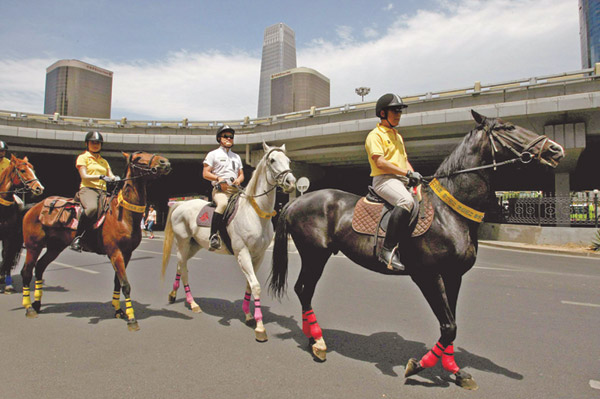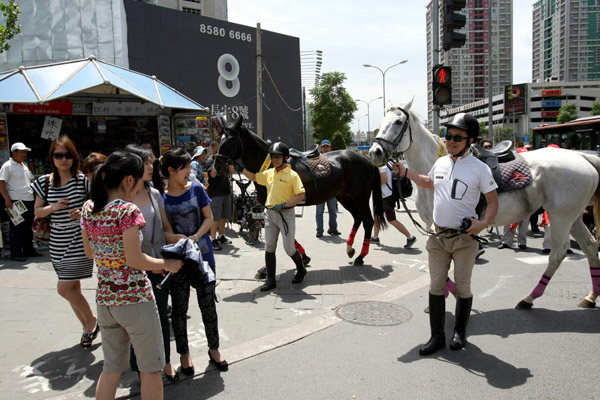Photos
Making perfect horse sense
Updated: 2011-06-08 08:12
By Wang Kaihao (China Daily)
 |
|
Five riders parade on the Beijing streets on Friday to raise awareness of an eco-friendly, low-carbon means of travel. Photos by Jiang Dong / China Daily |
Fed up with using your car amid rising fuel prices, soaring parking costs and bumper-to-bumper traffic? Try riding a horse to work. At least, that’s what more than 100 people in 16 Chinese cities did on Friday, two days before World Environment Day.
In Beijing, five riders were greeted by a blitzkrieg of flashlights and hordes of curious onlookers as they made their way from Gaobeidian in the east of the city, through the capital's central business district of Guomao, to the hutong area of Houhai - a distance of 24 kilometers.
"We're not the first ones to try this," says Wutzala, a Manchu man and initiator of the activity, who is also a member of the Beijing-based China Equestrian Association.
"Some city people are already using horses as their main means of travel."
Wutzala says he was merely bringing riding to society's attention.
"It's not a stunt. We're not just riding a horse but raising awareness of an eco-friendly, low-carbon means of travel."
He says Beijing's notorious traffic leaves little room for low-carbon travel, be it by bicycle, walking, or roller-skating.
Zhao Xiaoshuang, one of the five riders says, "It's really enjoyable and fashionable to ride a horse on city streets. More importantly, it's more convenient and even faster than navigating a car in a traffic jam."
Zhao lives in Beijing's eastern outskirt of Tongzhou and works downtown. During the rush hour, her car barely covers 10 km in an hour.
 |
|
Riders are greeted by curious onlookers on the Beijing streets. |
But a woman onlooker surnamed Yu says, "I don't think it's practical to ride a horse to office every day.
"We don't have the infrastructure and the roads for horses in this city. Beijing is just too crowded."
The riders, though, all sounded a note of optimism.
"Maybe in the future, when more people join our group, we can build stables in residential communities," Zhao says.
They are even hoping there will come a time when there will be horse lanes on Beijing's roads.
According to Zhao, the noise from the crowds and horns did not bother the well-trained and docile animals. They remained mostly calm all along the route.
Although watched by the traffic police, no one intervened, and the riders reached Houhai.
China's traffic rules have nothing that governs horse-riding on city streets.
But Wutzala says, "We have our own rules."
"Our riders have to wear helmets and are forbidden from riding too quickly. We also let the horses rest and drink water from time to time. In addition, we have to watch out for horse droppings.
Another onlooker surnamed Zhou says, "It's not a bad idea to use horses for travel.
"It's a greener way as long as riders can clean up after the horses," says the 68-year-old who once raised horses.
Meanwhile, Jia Huilin, 54, a restaurant manager, and one of the five riders, sees an additional benefit from riding to work.
"Sometimes, you have to struggle to keep your balance on horseback. But that's a kind of physical exercise. I've lost about 25 kg in the past few years because of horse riding and I now feel healthier and younger. "
Although horse riding is considered a luxury sport in China, Wutzala says, "The horses in China are much cheaper than abroad.
"Horse riding is actually cheaper than driving cars."
Doing the math, he says a common horse in China costs between 5,000 yuan ($770) and 50,000 yuan. Another 1,000 yuan every month is needed to cover its food, water, and cleaning needs.
In comparison, a mid-sized sedan will cost 100,000 to 150,000 yuan. Added to this is the high monthly maintenance costs and rising oil prices.
"With the general increase in prices, horses will also become expensive. When oil hits 20 yuan a litre, maybe horses will cost more than cars.
"So, it's best to act now," Wutzala jokes.
Specials

Birthday a new 'starting point'
China's national English language newspaper aims for a top-notch international all-media group.

Room at the inn
The Chinese hotel industry experiences a building boom, prompting fears of oversupply.

Pearls of wisdom
Chinese pearl farmers dominate the world market but now want to work smarter, not harder